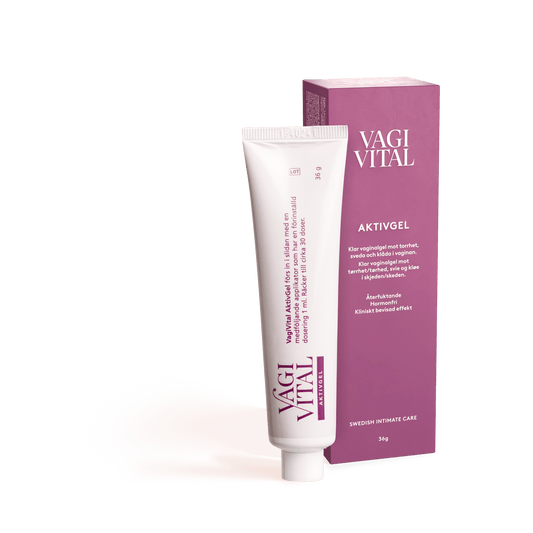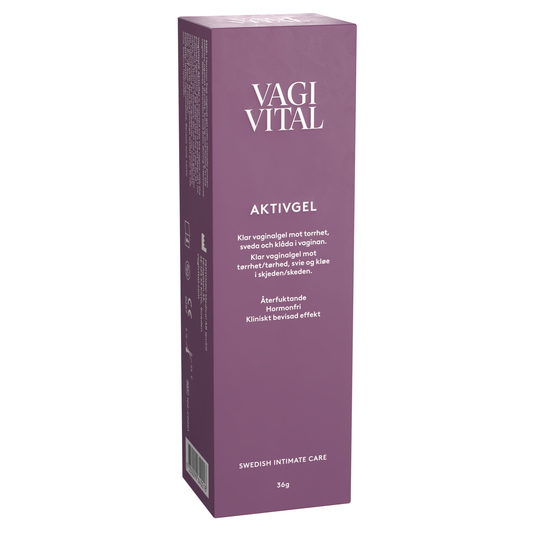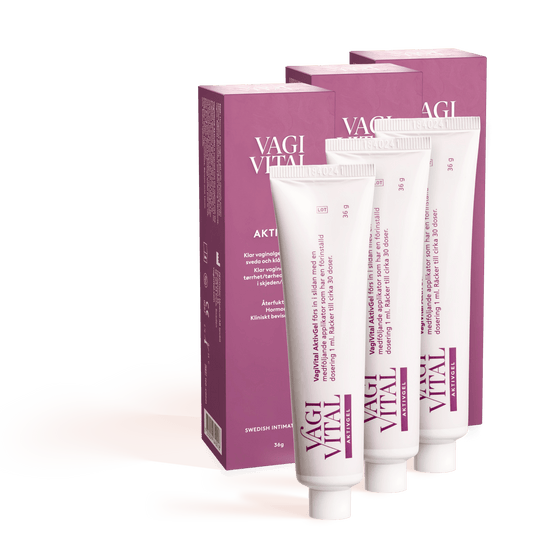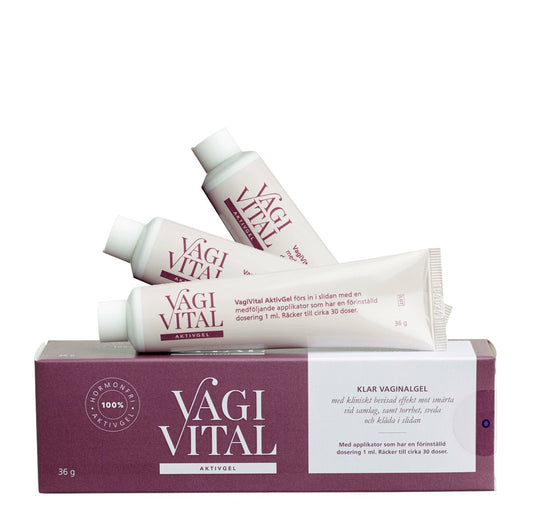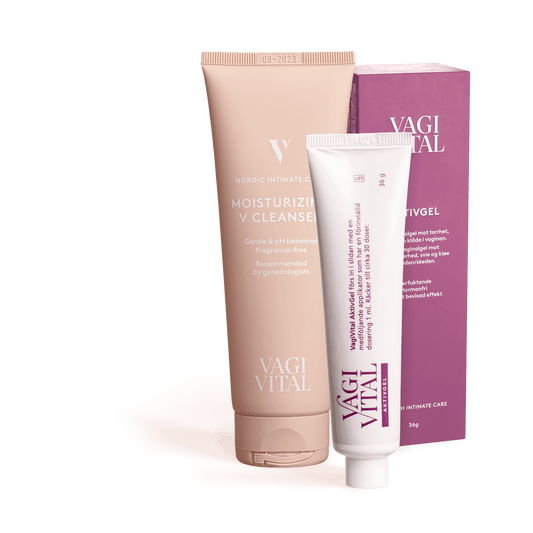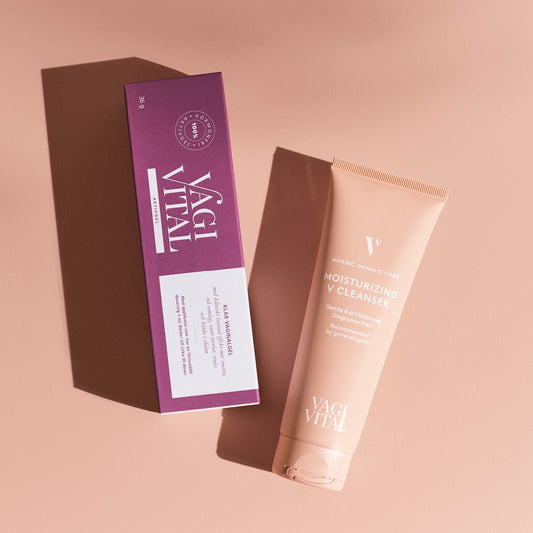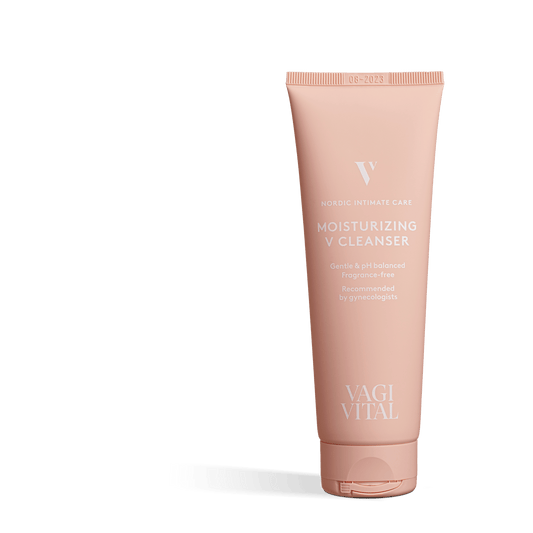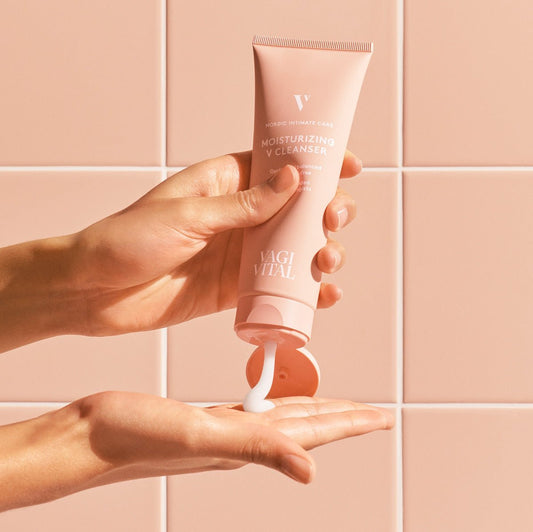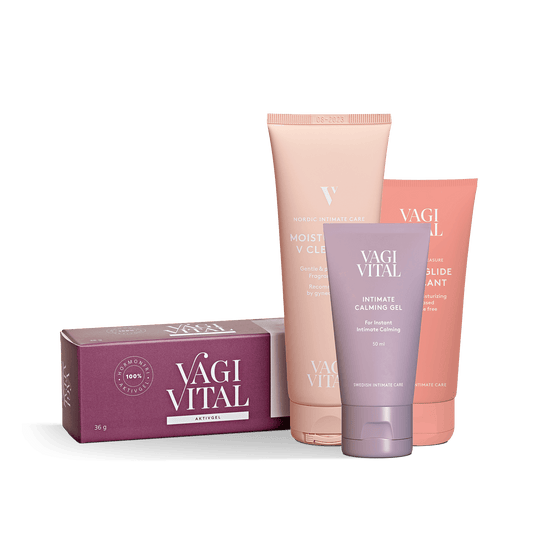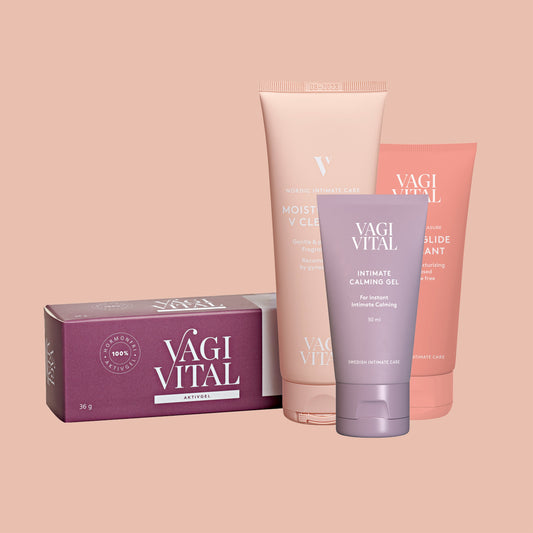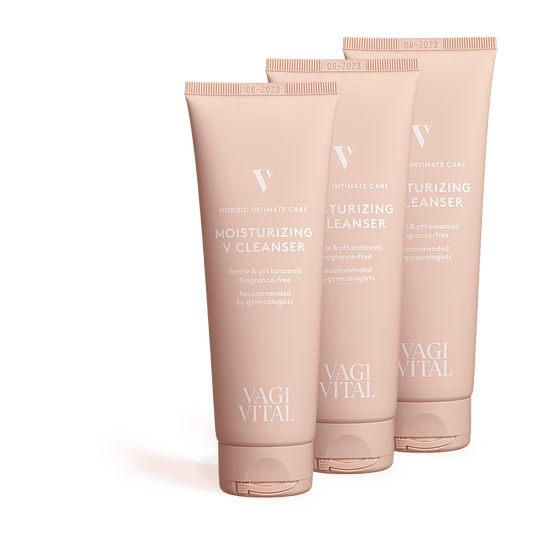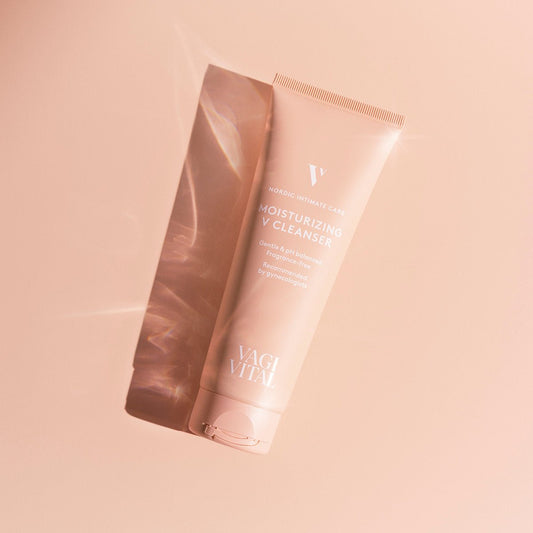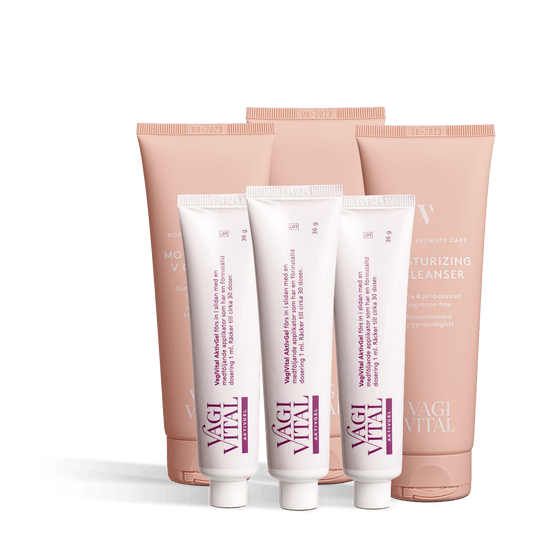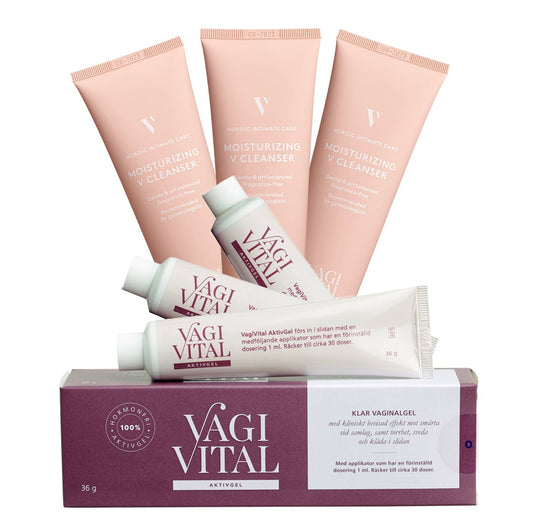Postmenopause – Life After Menopause
Many talk about menopause as a single point in life. But the truth is, it’s a process – a journey through several phases. And it can be confusing. You may have heard terms like premenopause, menopause, and postmenopause – but what do they really mean? When do they start, how do you know where you are, and what happens in the body when we enter the final phase: postmenopause?
Because it is now, when your period has been gone for a year or more, that many women begin to notice new changes – in the body, the skin, the intimate area, and sometimes in the soul. But this doesn’t have to be the end – it can be a new beginning ❤️
How are the body, brain, and hormones affected when estrogen has dropped and remains at a low, stable level? What changes are common – and what positive effects do many women experience specifically during postmenopause?
Could this actually be a phase when we get the chance to understand our bodies deeply, enjoy more, and feel better than we have in a long time?
MENOPAUSE, PERIMENOPAUSE, AND POSTMENOPAUSE – WHAT’S WHAT?
We often talk about menopause as a vague period with hot flashes, irregular periods, and dry mucous membranes – but what does it really mean? And what’s the difference between menopause, perimenopause, and postmenopause?
It can be confusing, especially since the terms are used differently in various countries and contexts. Here we clarify them in a way that makes them easier to understand:
🌸 Menopausal Transition (Perimenopause) This is the phase leading up to menopause, often starting in your 40s or even earlier, when hormone levels fluctuate and symptoms such as hot flushes, mood changes, fatigue, and irregular periods may begin.
🌸 Menopause Menopause itself refers to the point in time when a woman has not had a period for 12 consecutive months, marking the end of menstrual cycles. Because it can only be confirmed retrospectively, the exact date of menopause is known after a full year without periods. In the UK, the average age for menopause is around 51.
🌸 Postmenopause This stage begins after menopause and lasts for the rest of a woman’s life. Estrogen levels remain consistently low, and while some may believe the menopause ‘ends’ here, many women experience new changes during postmenopause — such as vaginal dryness, urinary issues, or changes in libido. At the same time, many report greater self-awareness, freedom, and a renewed connection with their bodies 🙌.
It is only during postmenopause — after 12 months without periods and with stable low estrogen levels — that the body settles into a new hormonal balance.
COMMON CHANGES IN POSTMENOPAUSE
When estrogen has dropped to a stable low level, many things change – sometimes gradually, sometimes clearly. Many women describe the body “settling” hormonally, but new needs arise. It’s not that something is wrong – but that the conditions have changed.
Here are some of the most common changes in postmenopause:
🔹 Dry mucous membranes – when the intimate area changes When estrogen levels fall during postmenopause, the tissues in the intimate area are affected. The mucous membranes of the vagina can become thinner, drier, and less elastic – making them more sensitive to irritation, friction, and small wounds.
This is because estrogen normally helps keep the mucosa hydrated, soft, and resilient. When the hormone disappears, blood flow and moisture levels in the tissue decrease.
The result? For some women, nothing at all. But for many – actually up to half of all women in postmenopause – it can lead to symptoms such as:
🌸 Burning or stinging sensation 🌸 Dryness or chafing 🌸 Itching 🌸 Intercourse can feel uncomfortable or painful 🌸 Frequent urination (urgency) 🌸 Recurring urinary tract infections
💡 Worth knowing A Swedish study from Karolinska University Hospital showed that women treating dry mucous membranes with VagiVital AktivGel experienced results as good or better than those using local estrogen cream – despite the gel being completely hormone-free. (1)
Read more & buy AktivGel here
🔹 Sex can change and improve When estrogen decreases, moisture production and blood circulation in the vagina change – which can make penetrative sex more sensitive. But this doesn’t mean desire disappears. On the contrary, many women describe how their sex life improves after menopause.
Several studies show that women in postmenopause often experience more presence, less pressure, and greater freedom in their sex lives. For some, it’s about letting go of old demands. For others, it’s about finding new ways to pleasure – with foreplay, playfulness, or a different kind of intimacy.
Some women even have better sex after 55 than ever before. Desire doesn’t have to look like it used to – but it can still be strong, vibrant, and pleasurable ❤
💡 Tip In addition to AktivGel, VagiVital Active Glide can help reduce friction and increase pleasure – even for women who don’t suffer from dryness. It’s based on AktivGel’s formula, pH-balanced, fragrance-free, and designed for sensitive mucous membranes.
Buy Active Glide lubricant here
🔹 Sleep changes again Some women sleep better when hot flashes and night sweats subside. For others, sleep may still be disturbed – by nighttime urgency, anxiety, or altered sleep patterns.
💡 What can help? Dry mucous membranes in the vagina and urinary tract can make you feel the need to urinate more often – especially at night. This is common in postmenopause. But there is help. In a study at Karolinska University Hospital, women using VagiVital AktivGel not only improved moisture balance but also reduced urgency symptoms – which in turn can improve sleep quality. Many women notice a difference when they start moisturizing regularly.
Buy 3-pack AktivGel – get 10% discount here
🔹 Self-esteem takes a new direction Several studies show that many women in postmenopause experience increased self-awareness, less stress, and more focus on themselves. Many describe a feeling of “letting go” of others’ expectations – and instead begin listening inward. The body changes – but often this brings greater calm, a more mature relationship with sexuality, and a stronger sense of self-worth.
5 WAYS TO EMPOWER YOURSELF IN POSTMENOPAUSE
What do the body and soul need a little extra of after menopause? Here are five areas where small changes can make a big difference for your well-being.
Prioritize sleep A short nap during the day can work wonders. A US research review showed that women over 60 who napped 10–45 minutes during the day had better focus, mood, and memory – without disturbing nighttime sleep.
💡 Try lying down for 20 minutes after lunch, preferably before 3 PM, to give your brain a break.
Support with food and supplements After menopause, the body’s ability to absorb calcium decreases – while the skeleton needs more support. A European study showed that women who took 1,200 mg calcium and 800 IU vitamin D daily had stronger bones and reduced fracture risk.
💡 Choose foods high in calcium (dairy, almonds, beans) and consider supplementing with vitamin D.
Exercise for strength and balance A Swedish study from Umeå University showed that strength training twice a week can slow bone loss and strengthen the skeleton – especially in hips and lower back.
💡 Do squats, calf raises, and balance exercises at home, preferably barefoot. Walk stairs or dance – it’s enough.
Protect your skeleton A British study published in Osteoporosis International found that women who were regularly active and ate calcium- and vitamin D-rich diets had lower risks of osteoporosis and falls.
💡 Avoid smoking, drink moderately, and eat nutrient-rich foods. Aim for strong bones every day.
Rediscover desire A qualitative study from Uppsala University showed that many women in postmenopause experience a more relaxed and pleasurable sexuality – especially when finding new ways to approach intimacy ❤
💡 Want concrete advice and inspiration?
Read 5 tips to nurture and awaken your desire here
STAY PUSSYTIVE – WHEN HOLISTIC CARE IS NEEDED
Caring for the intimate area in postmenopause isn’t about a quick fix. It’s about creating new routines that support hydration, relieve irritation, and make room for pleasure.
The VagiVital Stay Pussytive Kit contains four complementary products:
🌿 AktivGel – moisturizes the vagina and rebuilds the mucous membrane
💜 Calming Gel – soothes the skin around the vaginal opening from itching, burning, and redness
💧 V Cleanser – gently cleanses without drying out
❤ Active Glide – lubricant with extra care for the mucous membrane
Explore the Stay Pussytive Kit here
A NEW CHAPTER – WITH MORE OF YOU
Postmenopause is not an ending – it’s the beginning of something new. A chapter where you get the chance to reclaim, discover new things, and care for what matters.
With the right knowledge, products, and support, this can be a time when you feel better than you have in a long time – in your skin, your intimate area, your desire, and your vitality.
And maybe it’s now that you start listening even more to yourself ❤
SOURCES
Ekström H, Stjernquist M. Local treatment of vaginal atrophy with a nonhormonal cream: a randomised controlled study. Menopause. 2013.
Umeå University. Women’s quality of life after menopause – a longitudinal study.
Thomas HN, Thurston RC. Sexual activity and vaginal symptoms in postmenopausal women: Associations with psychosocial factors. Menopause. 2025.
Bergbom I, Nyström M, Berterö C. Sexuality and intimacy in older women: a qualitative study of women’s experiences after menopause. BMC Women’s Health. 2025.
Johansson A, Wennberg A-L. Women’s experience of sexuality in postmenopause – a review of current research. BMC Public Health. 2024.
Take care & Stay Pussytive ❤
/ Fanny Falkman Grinndal Business Manager Nordics Peptonic Medical AB fanny.falkman-grinndal@peptonicmedical.se
Recommended products for you
- Choosing a selection results in a full page refresh.
- Opens in a new window.
